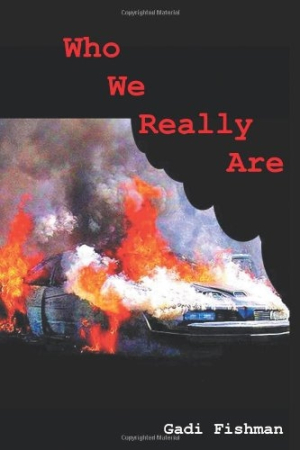Who We Really Are
The eighteen-year-old protagonist in Gadi Fishman’s Who We Really Are leaves Israel for New York City, at his overbearing mother’s insistence, to avoid serving in the Israeli army. Headstrong but smart, Al moves in with his indifferent biological father, Tom, who introduces the boy to alcohol. When Al’s stepbrother, Jim, follows him to the United States, they rent an apartment together and embark upon a series of misadventures. The overburdened plot moves back to Israel several times and shifts among various locations in New York City and Philadelphia. Girlfriends, business associates (legitimate and otherwise), and family members, including his beloved stepfather, Pap, appear, disappear, and reappear in Al’s life. Neither the table of contents nor chapter breaks provide direction through this complex story.
Al is an alcoholic who refuses to acknowledge his addiction, and readers get a good sense of how his drinking habit evolves from his first taste to indugling socially to complete dependence. He’s an impetuous youth who makes ever more damaging decisions as drink takes over his life. He drinks to celebrate and to forget disappointments, insecurities, and failures. Any excuse triggers it, but when he tries to stop, he can’t. While this is the usual pattern of an alcoholic, this character also describes how he feels when he goes into the oblivion of intoxication and why he seeks it, which gives readers a sense of what alcoholic compulsion is about.
Although self-absorbed, Al goes to extreme measures to help the people he loves. After realizing that Jim has been set up for a robbery while working the night shift at a parking lot, he rushes to save him. The author frequently employs passive voice, thus failing to capture the emotional intensity of this and other action scenes. “Jim was laying on the ground; a person was standing beside him…cops were all over me,” Al explains.
Mom, Pap, and their two younger daughters soon follow Al and Jim to New York, and they move into the brothers’ small apartment. Bickering erupts among them, and Mom insists they find a bigger place. The men establish a habit of drinking vodka every evening after dinner, which intensifies the family infighting. This scenario of thoughtless squabbling, substance abuse, tearful reconciliation, and reignited anger reoccurs throughout the book.
Al’s penchant for drink results in a pattern of building a successful business, drinking heavily until the business fails, and temporary sobriety as he starts the cycle over again. He refuses to acknowledge his addiction, insisting that alcohol doesn’t affect him. After yet another business failure, Pap takes him back to Israel. Al says, “Understanding my current situation and thinking about my new life in Israel brought me further despair, so instead of preparing, I commenced drinking.”
The author lives in Israel and has written a previous book in Hebrew. Passages of inspired writing offset the book’s less polished text. Grammatical errors occur on almost every page, such as “you are dull when you drunk” and “use to” instead of “used to.” Platitudes and superficial subplots further slow the narrative. Al’s repetitive ruminations about the lessons he’s learned from his mistakes dilutes the effectiveness of the story’s conclusion.
Despite its shortcomings, Fishman’s book presents a stark account of an alcoholic’s downfall and recovery. Those interested in or directly impacted by alcoholism will benefit from reading Who We Really Are.
Reviewed by
Margaret Cullison
Disclosure: This article is not an endorsement, but a review. The publisher of this book provided free copies of the book and paid a small fee to have their book reviewed by a professional reviewer. Foreword Reviews and Clarion Reviews make no guarantee that the publisher will receive a positive review. Foreword Magazine, Inc. is disclosing this in accordance with the Federal Trade Commission’s 16 CFR, Part 255.

